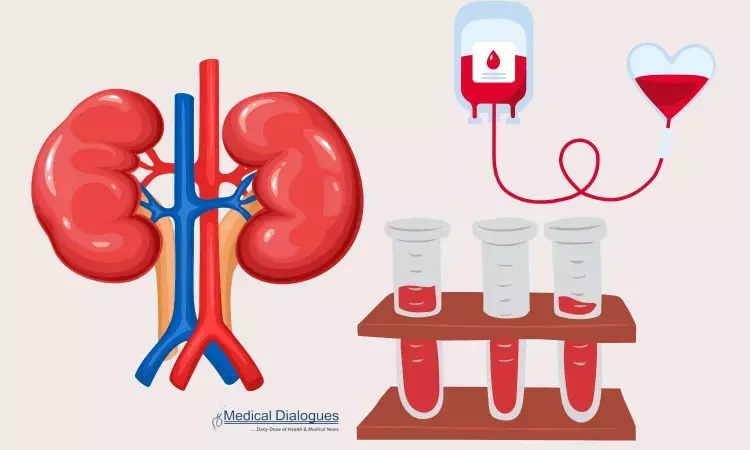- Home
- Medical news & Guidelines
- Anesthesiology
- Cardiology and CTVS
- Critical Care
- Dentistry
- Dermatology
- Diabetes and Endocrinology
- ENT
- Gastroenterology
- Medicine
- Nephrology
- Neurology
- Obstretics-Gynaecology
- Oncology
- Ophthalmology
- Orthopaedics
- Pediatrics-Neonatology
- Psychiatry
- Pulmonology
- Radiology
- Surgery
- Urology
- Laboratory Medicine
- Diet
- Nursing
- Paramedical
- Physiotherapy
- Health news
- Fact Check
- Bone Health Fact Check
- Brain Health Fact Check
- Cancer Related Fact Check
- Child Care Fact Check
- Dental and oral health fact check
- Diabetes and metabolic health fact check
- Diet and Nutrition Fact Check
- Eye and ENT Care Fact Check
- Fitness fact check
- Gut health fact check
- Heart health fact check
- Kidney health fact check
- Medical education fact check
- Men's health fact check
- Respiratory fact check
- Skin and hair care fact check
- Vaccine and Immunization fact check
- Women's health fact check
- AYUSH
- State News
- Andaman and Nicobar Islands
- Andhra Pradesh
- Arunachal Pradesh
- Assam
- Bihar
- Chandigarh
- Chattisgarh
- Dadra and Nagar Haveli
- Daman and Diu
- Delhi
- Goa
- Gujarat
- Haryana
- Himachal Pradesh
- Jammu & Kashmir
- Jharkhand
- Karnataka
- Kerala
- Ladakh
- Lakshadweep
- Madhya Pradesh
- Maharashtra
- Manipur
- Meghalaya
- Mizoram
- Nagaland
- Odisha
- Puducherry
- Punjab
- Rajasthan
- Sikkim
- Tamil Nadu
- Telangana
- Tripura
- Uttar Pradesh
- Uttrakhand
- West Bengal
- Medical Education
- Industry
Exosomes from umbilical cord mesenchymal stromal cells promote collagen production of fibroblasts from pelvic organ prolapse: Study

Pelvic organ prolapse (POP) involves pelvic organ herniation into the vagina due to pelvic floor tissue laxity, and vaginal structure is an essential factor. In POP, the vaginal walls exhibit abnormal collagen distribution and decreased fibroblast levels and functions.
The intricate etiology of POP and the prohibition of transvaginal meshes in pelvic reconstruction surgery present challenges in targeted therapy development. Human umbilical cord mesenchymal stromal cells (hucMSCs) present limitations, but their exosomes (hucMSC-Exo) are promising therapeutic tools for promoting fibroblast proliferation and extracellular matrix remodeling.
The aim of research was to investigate the effects of hucMSC-Exo on the functions of primary vaginal fibroblasts and to elucidate the underlying mechanism involved.
Human vaginal wall collagen content was assessed by Masson’s trichrome and Sirius blue staining. Gene expression differences in fibroblasts from patients with and without POP were assessed via RNA sequencing (RNA-seq). The effects of hucMSC-Exo on fibroblasts were determined via functional experiments in vitro. RNA-seq data from fibroblasts exposed to hucMSC-Exo and microRNA (miRNA) sequencing data from hucMSC-Exo were jointly analyzed to identify effective molecules.
In POP, the vaginal wall exhibited abnormal collagen distribution and reduced fibroblast 1 quality and quantity. Treatment with 4 or 6 μg/mL hucMSC-Exo suppressed inflammation in POP group fibroblasts, stimulated primary fibroblast growth, and elevated collagen I (Col1) production in vitro. High-throughput RNA-seq of fibroblasts treated with hucMSC-Exo and miRNA sequencing of hucMSC-Exo revealed that abundant exosomal miRNAs downregulated matrix metalloproteinase 11 (MMP11) expression.
It was concluded that HucMSC-Exo normalized the growth and function of primary fibroblasts from patients with POP by promoting cell growth and Col1 expression in vitro. Abundant miRNAs in hucMSC-Exo targeted and downregulated MMP11 expression. HucMSC-Exo-based therapy may be ideal for safely and effectively treating POP.
Citation: Xu LM, Yu XX, Zhang N, Chen YS. Exosomes from umbilical cord mesenchymal stromal cells promote the collagen production of fibroblasts from pelvic organ prolapse. World J Stem Cells 2024; 16(6): 708-727
URL: https://www.wjgnet.com/1948-0210/full/v16/i6/708.htm
DOI: https://dx.doi.org/10.4252/wjsc.v16.i6.708
Dr Kamal Kant Kohli-MBBS, DTCD- a chest specialist with more than 30 years of practice and a flair for writing clinical articles, Dr Kamal Kant Kohli joined Medical Dialogues as a Chief Editor of Medical News. Besides writing articles, as an editor, he proofreads and verifies all the medical content published on Medical Dialogues including those coming from journals, studies,medical conferences,guidelines etc. Email: drkohli@medicaldialogues.in. Contact no. 011-43720751


